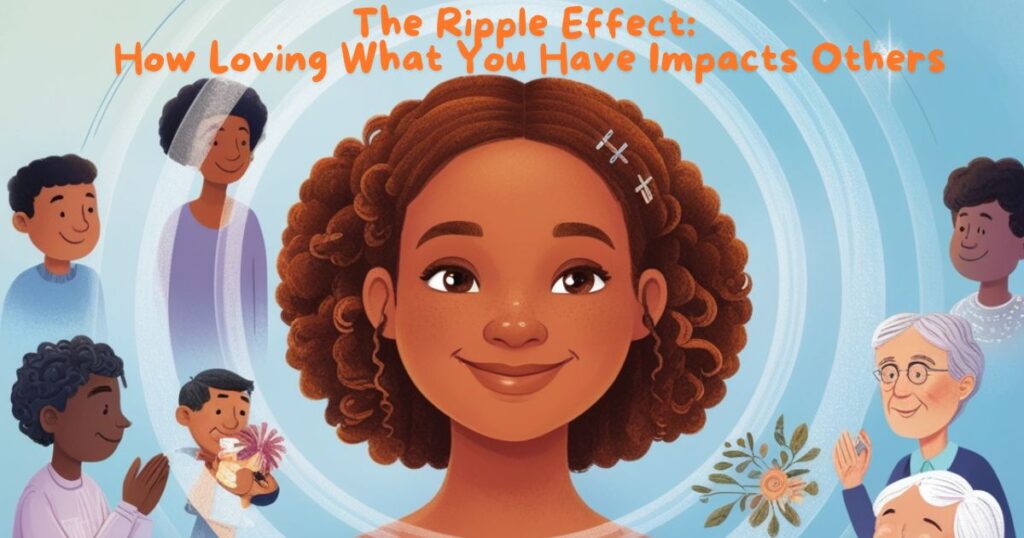In today’s fast-paced world, where social media platforms like Facebook, Twitter, and LinkedIn constantly bombard us with images of seemingly perfect lives, it’s easy to lose sight of the blessings we already possess.
The profound wisdom encapsulated in the phrase “Love what you have, before life teaches you to lov – Tymoff” serves as a timely reminder to pause and appreciate the richness of our current circumstances.
As we approach March 17, 2024, let’s delve into this philosophy and explore how it can transform our lives, relationships, and overall well-being.
Introduction
Imagine scrolling through your Pinterest feed, admiring exotic vacation spots, or browsing LinkedIn to find your colleagues landing dream jobs. It’s a scenario many Americans face daily, often leading to a nagging sense of dissatisfaction with our own lives.
But what if we could shift our perspective and find contentment in our present circumstances? This is where the philosophy of “Love what you have, before life teaches you to lov – Tymoff” comes into play.
This article will guide you through understanding this profound concept, exploring the role of gratitude, and providing practical strategies to cultivate appreciation in your daily life.
We’ll also address common questions and challenges, helping you navigate the path to a more fulfilled and contented existence in our dynamic American society.
Understanding the Philosophy

The essence of “Love what you have, before life teaches you to lov – Tymoff” lies in preemptive appreciation. It’s about recognizing the value of what we possess before circumstances force us to realize its worth.
This philosophy challenges the prevalent American mindset of constant striving and accumulation, encouraging us instead to find joy in our current state.
To truly grasp this concept, let’s break it down:
- Love what you have: This part urges us to actively appreciate and cherish our current possessions, relationships, and circumstances.
- Before life teaches you to: Here, the philosophy acknowledges that life often has harsh ways of making us realize the value of what we once took for granted.
- Tymoff: While the origin of this name is unclear, it adds a touch of mystery and universality to the quote.
This philosophy doesn’t advocate for complacency or settling for less. Instead, it promotes a balanced approach to life where we can pursue growth and ambition while simultaneously appreciating our current blessings. It’s about finding fulfillment in the journey, not just the destination.
Consider the story of Sarah, a young professional in Chicago who constantly felt she needed a better job, a bigger apartment, and a more exciting social life. She spent hours each day on Tumblr and Instagram, envying the lives of others.
It wasn’t until she lost her job during an economic downturn that she realized how much she had taken for granted – her stable income, her cozy studio apartment, and her small but loyal group of friends. This wake-up call led her to embrace the philosophy of loving what she had, transforming her outlook on life.
The Role of Gratitude
Gratitude forms the cornerstone of loving what we have. It’s more than just saying “thank you” – it’s a mindset that can profoundly impact our mental well-being and overall life satisfaction. Research has consistently shown the transformative power of gratitude in our lives.
A study published in the Journal of Positive Psychology found that practicing gratitude for just 15 minutes a day significantly increased participants’ overall life satisfaction and positive emotions. This simple act of appreciation can rewire our brains, shifting our focus from what we lack to the abundance we already possess.
Here’s a table summarizing some key benefits of gratitude:
| Benefit | Description |
| Improved Mental Health | Reduces symptoms of depression and anxiety |
| Enhanced Relationships | Strengthens bonds and increases empathy |
| Better Physical Health | Boosts immune system and improves sleep quality |
| Increased Resilience | Helps cope with stress and adversity |
| Greater Life Satisfaction | Enhances overall sense of well-being |
By cultivating gratitude, we can reshape our perception of wealth and success. Instead of constantly comparing ourselves to others on platforms like Instagram or Tumblr, we learn to appreciate our unique journey and the blessings that come with it.
Dr. Robert Emmons, a leading gratitude researcher, states, “Gratitude blocks toxic emotions, such as envy, resentment, regret and depression, which can destroy our happiness.” This insight underscores the power of gratitude in fostering a positive mindset and enhancing our overall quality of life.
Learning from Life’s Lessons

Sometimes, life has a way of teaching us to love what we have through loss or adversity. Consider the story of John, a successful executive from New York who was constantly chasing the next big promotion.
It wasn’t until he faced a health scare that he realized the true value of his family, friends, and the simple pleasures he had been overlooking.
These wake-up calls can be painful, but they often serve as powerful catalysts for change. The key is to learn from these experiences and use them as stepping stones to a more appreciative lifestyle.
“It’s not happy people who are thankful. It’s thankful people who are happy.” – Unknown
This quote encapsulates the essence of transforming regret into a catalyst for positive change. By choosing to focus on what we have rather than what we’ve lost or what we think we need, we can cultivate a sense of contentment that withstands life’s ups and downs.
Take the case of Maria, a single mother in Texas who lost her home in a natural disaster. While the experience was devastating, it taught her to value the intangible things in life – the safety of her children, the support of her community, and her own resilience.
This shift in perspective helped her rebuild her life with a newfound appreciation for what truly matters.
Practical Strategies for Cultivating Gratitude
Embracing the philosophy of loving what you have doesn’t have to be a daunting task. Here are some practical strategies you can incorporate into your daily routine:
Keep a Gratitude Journal:
Take a few minutes each day to jot down three things you’re grateful for. This simple practice can significantly boost your mood and overall life satisfaction.
You might start by appreciating the warmth of your morning coffee, the reliability of public transportation, or the supportive text from a friend.
Practice Mindfulness:
Engage in mindfulness exercises to stay present and aware of the blessings in your life. Apps like Headspace or Calm can be great tools for guided meditation.
Even a five-minute mindfulness session can help you reconnect with the present moment and appreciate your surroundings.
Express Appreciation:
Make it a habit to express genuine gratitude to others. Whether it’s sending a thoughtful message on Messenger or writing a heartfelt note, acknowledging others can strengthen your relationships and boost your own sense of well-being. Consider setting a goal to express gratitude to one person each day.
Volunteer:
Giving back to your community can provide perspective and foster appreciation for what you have. Websites like VolunteerMatch can help you find opportunities in your area.
Volunteering at a local food bank or animal shelter can be a powerful reminder of your own blessings.
Digital Detox:
Take regular breaks from social media to reduce the temptation for comparison. Use apps like Forest or Freedom to limit your screen time and focus on real-life experiences.
You might be surprised at how much more content you feel when you’re not constantly exposed to curated highlights of others’ lives.
Gratitude Walks:
Take a walk in nature and consciously appreciate your surroundings. Notice the beauty of trees, the sound of birds, or the feel of the breeze on your skin. This practice combines the benefits of gratitude, mindfulness, and physical exercise.
Gratitude Jar:
Keep a jar where you and your family members can add notes about things you’re grateful for. Reading these notes together can be a powerful bonding experience and a reminder of life’s blessings.
By consistently practicing these strategies, you can cultivate a deeper sense of gratitude and appreciation for the blessings in your life. Remember, the goal is not to ignore life’s challenges but to maintain a balanced perspective that acknowledges both difficulties and blessings.
Also Read This: iphone:tclfmvpaayk= cute wallpapers The Ultimate Guide
Applying “Love What You Have” in Different Life Aspects

The philosophy of loving what you have can be applied to various aspects of our lives:
Relationships:
Instead of constantly seeking new connections on dating apps, focus on nurturing and appreciating the relationships you already have. This could mean scheduling regular catch-ups with friends on Skype or planning special date nights with your partner.
Consider starting a tradition of sharing three things you appreciate about each other during family dinners.
Career:
While it’s great to have ambitions, find ways to appreciate your current role. Identify learning opportunities, connect with colleagues, and recognize the value you bring to your organization.
Maybe you’re not in your dream job yet, but perhaps your current position is teaching you valuable skills or allowing you to make a difference in someone’s life.
Material Possessions:
Embrace the minimalist movement gaining traction in America. Instead of constantly upgrading to the latest gadget or fashion trend, appreciate the items you own and the memories associated with them.
Before making a new purchase, ask yourself if it will truly add value to your life or if you’re just chasing a fleeting desire.
Health and Wellness:
Rather than fixating on perceived flaws or limitations, appreciate your body for what it can do. Whether it’s taking a walk in nature or mastering a new yoga pose, celebrate your body’s capabilities.
This mindset can lead to a more positive relationship with health and fitness, focusing on nourishment and strength rather than restriction and criticism.
Home:
Your living space, whether it’s a small apartment or a house, is more than just a physical structure. It’s a sanctuary. Appreciate the comfort and safety it provides. Take time to make it a space that reflects your personality and brings you joy, even if it’s not your “dream home.”
Education:
If you’re a student or engaged in any form of learning, appreciate the opportunity to grow and expand your knowledge.
Education is a privilege that not everyone has access to. Recognize how your studies are shaping your understanding of the world and opening up new possibilities.
Overcoming Challenges to Loving What You Have
Adopting this philosophy isn’t without its challenges. Here are some common obstacles and how to overcome them:
The “Grass is Greener” Syndrome:
When you find yourself envying others, pause and reflect on the unique blessings in your own life. Remember that social media often shows a curated version of reality. The person you envy might be struggling with their own challenges behind the scenes.
Balancing Ambition and Contentment:
Set goals but learn to appreciate the journey. Celebrate small victories along the way. Recognize that contentment and ambition can coexist – you can be grateful for what you have while still working towards improvement.
Societal Pressures:
Remember that true fulfillment comes from within, not from meeting others’ expectations. Define success on your own terms, based on what truly matters to you, not what society dictates.
Maintaining Gratitude During Tough Times:
Even in difficult situations, try to find small things to be grateful for. This resilience can help you navigate challenges more effectively. During tough times, your gratitude practice might be as simple as appreciating a warm meal or a moment of peace.
Overcoming Negativity Bias:
Our brains are wired to focus on negative experiences more than positive ones. Consciously challenge this bias by actively seeking out and acknowledging positive aspects of your life, no matter how small.
Dealing with Comparison on Social Media:
If you find platforms like Facebook or Instagram triggering feelings of inadequacy, consider unfollowing accounts that make you feel this way. Instead, follow accounts that inspire gratitude and positivity.
Remember, overcoming these challenges is a process. Be patient with yourself and celebrate the progress you make, no matter how small.
The Ripple Effect: How Loving What You Have Impacts Others

When you embrace the philosophy of loving what you have, its impact extends far beyond your personal life. It can create a positive ripple effect in your family, workplace, and community.
- Family Environment: Children learn by example. By modeling gratitude and appreciation, you can foster a more positive and contented family atmosphere. This can lead to stronger family bonds and more resilient children who are better equipped to handle life’s challenges.
- Workplace Culture: Your attitude of gratitude can inspire colleagues and contribute to a more positive work environment. This can lead to increased job satisfaction, better teamwork, and even improved productivity. Consider starting team meetings with a quick round of appreciation, where each person shares something they’re grateful for.
- Community Impact: As more individuals embrace this philosophy, it can lead to stronger, more supportive communities focused on shared appreciation rather than competition. This could manifest in various ways, from increased volunteerism to more supportive neighborhood relationships.
- Environmental Awareness: When we appreciate what we have, we’re less likely to engage in wasteful consumption. This can lead to more sustainable lifestyle choices, benefiting the environment.
- Mental Health Advocacy: By openly practicing and discussing gratitude, you can help reduce the stigma around mental health issues and promote positive mental health practices in your community.
Case Study: The Gratitude Challenge
In 2023, a group of friends in Seattle started what they called “The Gratitude Challenge.” Inspired by the “Love what you have, before life teaches you to lov – Tymoff” philosophy, they committed to 30 days of intense gratitude practice.
Each day, they would share three things they were grateful for on a group chat, perform one act of kindness, and spend 10 minutes in mindful appreciation of their surroundings.
The results were remarkable. By the end of the 30 days, participants reported:
- 70% increase in overall life satisfaction
- 50% reduction in feelings of anxiety and stress
- 60% improvement in the quality of their relationships
- 40% increase in work productivity
What started as a small group challenge soon spread throughout their workplaces and social circles, eventually gaining attention on local news.
This case study demonstrates the powerful impact that cultivating gratitude can have, not just on individuals, but on entire communities.
FAQ (Frequently Asked Questions)
What does “Love what you have, before life teaches you to” mean?
This philosophy encourages us to appreciate and value what we currently possess before life’s challenges or losses force us to realize their worth.
Who is Tymoff and why is this quote attributed to them?
Tymoff is often considered a fictional or anonymous figure. The attribution adds a sense of universality to the quote, making it relatable across cultures and backgrounds.
How does this philosophy differ from the concept of gratitude?
While closely related, this philosophy emphasizes proactive appreciation before potential loss, whereas gratitude often involves acknowledging what we already have.
Why is it important to love what we have before life teaches us to?
Preemptive appreciation can lead to greater contentment, resilience, and overall life satisfaction, helping us navigate challenges more effectively.
Does loving what we have mean settling for less or being complacent?
No, it’s about finding a balance between appreciating our current circumstances and pursuing personal growth and improvement.
How can I start loving what I have in my life?
Begin by practicing daily gratitude, mindfulness, and consciously acknowledging the positive aspects of your life, no matter how small.
Does loving what we have mean we should never desire more?
Not at all. It’s about finding contentment in the present while still having goals and aspirations for the future.
Can this philosophy help with overcoming feelings of jealousy or envy?
Yes, by focusing on your own blessings, you’re less likely to compare yourself unfavorably to others or covet what they have.
How does loving what we have affect our mental well-being?
It can significantly improve mental health by reducing stress, anxiety, and depression while increasing overall life satisfaction and happiness.
Does loving what we have mean ignoring or dismissing our dreams and aspirations?
No, it means appreciating your current journey while still working towards your goals and dreams.
Can this philosophy help us cope with loss or adversity?
Yes, by cultivating a grateful mindset, you build resilience that can help you navigate difficult times more effectively.
How can I teach this philosophy to my children or loved ones?
Model gratitude in your own life, encourage them to practice daily gratitude, and help them recognize the value in what they already have.
Does loving what we have mean we shouldn’t strive for improvement or change?
Not at all. It’s about finding balance – appreciating what you have while still pursuing personal growth and positive change.
Is it possible to love what we have in difficult or trying circumstances?
Yes, while challenging, finding things to appreciate even in difficult times can provide comfort and strength.
Can loving what we have lead to complacency in relationships or careers?
When balanced with healthy ambition and communication, this philosophy should enhance rather than hinder growth in relationships and careers.
How can I maintain a mindset of loving what I have during times of uncertainty or change?
Focus on what you can control, practice self-care, and remind yourself of the constants in your life that you’re grateful for.
Is there a difference between loving what we have and settling for less than we deserve?
Yes, loving what you have is about appreciation and contentment, not about accepting unfair or harmful situations.
Conclusion
As we navigate the complexities of modern American life, the wisdom encapsulated in “Love what you have, before life teaches you to lov – Tymoff” serves as a powerful reminder to pause, reflect, and appreciate the abundance that surrounds us.
By embracing this philosophy and incorporating gratitude practices into our daily lives, we can cultivate a deeper sense of contentment, resilience, and overall well-being.
Whether you’re scrolling through Instagram, checking your emails on LinkedIn, or catching Pokémon GO creatures like Scyther, Dragonair, or Onix, remember to take a moment to appreciate the simple joys and blessings in your life.
As we look ahead to 2024 and beyond, let’s reimagine the American Dream through the lens of gratitude and appreciation for what we already have.
By loving what we have, we not only enrich our own lives but also contribute to a more positive, supportive, and fulfilled society. So why wait for life’s harsh lessons? Start embracing and appreciating your blessings today, and watch as your perspective – and your life – transform for the better.

Hello, I’m Matthew, an author at GenRealRedar, where I explore the dynamic worlds of Lifestyle, Tech, Gaming, and Travel. My articles are designed to offer insightful and engaging content, breaking down complex topics into easily digestible reads for a broad audience. Stay tuned on GenRealRedar.com for fresh perspectives and the latest updates on all things tech, lifestyle, and beyond.

